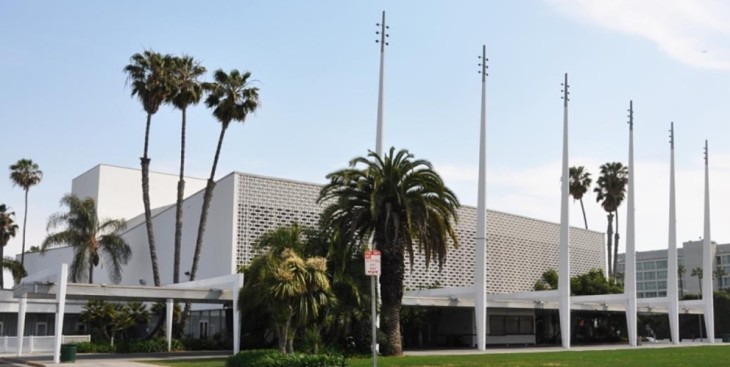There it was, to some extent as promised: The front page photo of three people on South Street in Lower Manhattan, all of them waist deep in water from a hurricane by way of the East River. A hurricane… in New York City. Some will remember the somewhat mind-bending images in the 2004 “disaster” movie “The Day After Tomorrow” in which gnarly-bad impacts of the greenhouse effect were represented as epic disaster scenes. Maybe that waist-deep water loses something without the THX audio and the bucket of popcorn… but again, a hurricane in Manhattan.
Now cut to: Presidential candidate and Ninja Christian prayer rally organizer Rick Perry. Perry tells a breakfast meeting audience on Aug. 16 that he does not believe in man-made global warming, calling it a scientific theory that has not been proven. “I think we’re seeing almost weekly, or even daily, scientists that are coming forward and questioning the original idea that man-made global warming is what is causing the climate to change, the Texas governor says. He adds that some want billions or trillions of taxpayer dollars spent to address the issue, but cautions: “I don’t think from my perspective that I want to be engaged in spending that much money on still a scientific theory that has not been proven and from my perspective is more and more being put into question.” His syntax, not mine.
Later, Perry echoes the breakfast comments while standing in front of his campaign bus. Audio from news cameras clearly reveals that as Perry is dismissing any impact of man on the environment… the engine from his bus is idling.
When? When are we going to react in any serious way to the impact we’re having on climate? I know… even if you’re waist-deep in river water in Manhattan you can still get to a night club and use your iPhone. The cable will still deliver “Family Guy”, even if the outside temperature is 112 degrees and chickens are dropping dead. There’s always one more energy bar in the house, even after weather has attacked real food sources and killed crops. Until you are too poor to buy water, you won’t die of dehydration. We could keep kidding ourselves for quite some time.
Righteous ranting has arguably yielded little on this issue (get with Al Gore on this), so maybe we could take a look at what the specific problem might be. I don’t think it’s necessarily that people don’t see or ‘get’ what they readily observe in regard to the obvious impacts. I think it’s that Americans as a society and culture have systematically been narrowing the scope of our endeavors since about 1970, and global warming is a huge event that requires an approach with scope. That’s way before you even get to the organizational issues, such as weak leadership saying “No” to taking steps that all the smart countries have already agreed on (Bush/Kyoto/2001).
It’s no longer for a lack of information. The Internet gives us a wealth of perspective literally at our finger tips. But to some extent, the Internet has an impact that is not dissimilar to the best documentary films. The information is presented, dramatically and convincingly. There is consensus, and people dialogue inside that consensus. Then… what actually happens? Do we come to feel that we know what needs to be done but we are helpless because of the scope of the changes that need to be made? Once we realize the amount of work that needs to be done, are we overwhelmed and thus righteously indignant but impotent against something like the destruction of the earth’s atmosphere?
Why are we overwhelmed? To some extent, we’ve lost the ability to conceptualize large-scale institutionalized change that doesn’t involve profit or gain. Some of this comes from looking for a consumer-related solution to problems, something that seems to deal with trouble but synergizes merchandizing, marketing, and sales. Save the environment and use a pump bottle of spray cleaner and not an aerosol can. But do keep buying the spray cleaner. This is action and effort we can see. We’re doing the instigating. We’re making the change.
But to get industry to stop polluting? To turn America away from oil and on to alternative fuels? The scope of that seems to provide no direct way for us to be involved. We’ll vote on proper measures, but how will they be presented to us? Will there be a proposition worded such that I think I say “No” to cap and trade, but in fact I am saying “Yes”? Can I boycott their products? What can I do, really? Buy a $40K Chevy Volt?
A lot more often than you’d like, you’ll hear people say “As soon as it starts killing people, then something will get done.” What about deaths from the tornadoes that are now appearing in aberrational clusters and taking out entire towns and cities? Twenty-two people died across eight states last weekend during Hurricane Irene. It’s no longer a movie projecting futuristic fantasy: Global warming is taking a toll and we’re still allowing ignorance and denial about it to have play in our culture. In the 1980s Ronald Reagan propagated ignorance of AIDS while people died, abetted by homophobic prejudice. Those were dark times for getting a consensus going on such things as the release of more anti-viral drugs. Today we already have consensus that we like clean air and weather that doesn’t kill us. Knowing we start out united on that should logically make us less intimidated about addressing the crisis.
Follow The Mirror on Twitter: twitter.com/SMMirror
Follow The Mirror on Facebook: twitter.com/SMMirror


























